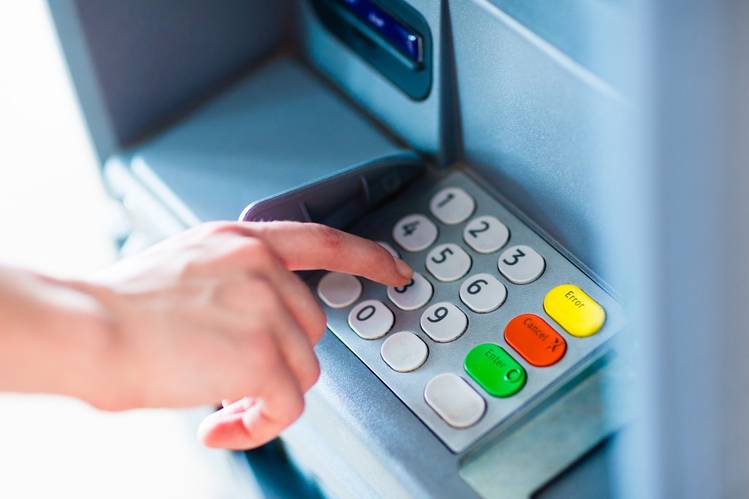Protecting Your Identity: Everything You Need to Know About Personal Identification Numbers (PINs)
"Treat your password like your toothbrush. Don't let anyone else use it, and get a new one every six months." - Clifford Stoll
Brief Insight
A Personal Identification Number (PIN) is a numerical code used as a security measure to authenticate the identity of an individual accessing a system or device. PINs are commonly used to protect sensitive information such as financial accounts, mobile devices, and computer systems.

PHOTO: https://www.pexels.com/uk-ua/@yankrukov/
Personal Identification Numbers (PINs): The Key to Secure Access and Personalization
A Personal Identification Number (PIN) is a unique numerical code used to authenticate an individual's identity when accessing a system or device. PINs are typically used as a security measure to protect sensitive information such as financial accounts, mobile devices, and computer systems. PINs are a form of two-factor authentication, providing an extra layer of security beyond simply entering a username and password.
A PIN can be a string of four to eight digits or more, depending on the system or device. The user selects or is provided with a PIN, which must then be entered each time they want to access the system or device. The PIN is stored securely in the system or device and is not visible to others.
PINs are commonly used for financial transactions such as accessing an ATM or making a purchase with a debit card. In these cases, the PIN is used to verify the identity of the person making the transaction and to prevent unauthorized access to their account. PINs are also used for mobile devices, computer systems, and other applications that require secure access.
In addition to being a security measure, PINs can also be used to personalize an individual's experience with a system or device. For example, a PIN can be used to set parental controls on a television, restrict access to certain features of a mobile device, or personalize the settings of a computer.
Overall, PINs are an important tool for protecting personal information and securing access to sensitive systems and devices. When creating a PIN, it is important to choose a unique and strong code that cannot be easily guessed or hacked. By using a strong and secure PIN, individuals can help protect their personal and financial information from unauthorized access.
Interesting Facts
The first widespread use of PINs was in the early 1960s when banks started to issue them to customers to access their accounts through ATMs.
A PIN is typically four to six digits long, but some systems allow for longer codes.
The most commonly used PINs are 1234, 1111, and 0000, which are easy to remember but also easy to guess.
In the United States, the Social Security number is often used as a form of Personal Identification Number, but it is not a secure means of authentication and can lead to identity theft.
Why Personal Identification Numbers (PINs) Are Essential for Protecting Your Identity and Security
A Personal Identification Number (PIN) is an essential tool for securing access to sensitive information and systems. There are several reasons why you may need a PIN, including:
- Protecting your financial accounts: When you open a bank account or apply for a credit card, you will typically be issued a PIN to protect your account. This PIN is used to authenticate your identity when you access your account, make transactions, or withdraw cash from an ATM.
- Securing your mobile device: Many mobile devices require a PIN to unlock the screen or access certain features. This PIN helps prevent unauthorized access to your device and the personal information stored on it.
- Enhancing your online security: When you create an online account, you may be prompted to create a PIN to secure your login information. This PIN can be used in addition to a password to provide two-factor authentication and increase the security of your account.
- Personalizing your experience: In some cases, a PIN can be used to personalize your experience with a system or device. For example, you can set parental controls on a television or restrict access to certain features of a mobile device using a PIN.
Overall, a PIN is an important tool for protecting your personal and financial information from unauthorized access. By using a strong and secure PIN, you can help prevent identity theft, fraud, and other security breaches.

PHOTO: https://www.pexels.com/uk-ua/@cottonbro/
The Many Applications of Personal Identification Numbers (PINs)
Personal Identification Numbers (PINs) are used in a variety of settings and industries. They are commonly used for security purposes, as well as for authentication and identification. Some of the most common places where PINs are used include:
- Banking and Finance: PINs are often used as a security measure for bank accounts and credit cards. They are typically required to access ATMs, make purchases, and perform online banking transactions.
- Telecommunications: PINs are used to secure mobile phones, SIM cards, and other telecommunications devices. They are also used for verifying the identity of callers and protecting voicemail and messaging services.
- Government Services: PINs are used to authenticate and secure access to government services and programs, such as tax filing and social security benefits.
- Healthcare: PINs are used to secure access to electronic medical records and other healthcare systems. They are also used for authentication purposes during telemedicine consultations.
- Education: PINs are used by students and faculty to access online learning platforms and to protect their personal information.
Overall, Personal Identification Numbers play an important role in maintaining security and ensuring the privacy of personal information. They are used in a variety of industries and settings and will continue to be an essential part of modern-day authentication and identification processes.
Interesting Facts
In some countries, such as Estonia, the government assigns a unique Personal Identification Number to every citizen at birth, which is used for identification and access to public services.
Some security experts recommend using a random sequence of numbers rather than a meaningful or easy-to-guess code for better security.
PINs can be vulnerable to hacking and brute-force attacks, which is why it's important to choose a secure code and keep it private.
How to Obtain a Personal Identification Number (PIN) in Different Countries
To obtain a Personal Identification Number (PIN), you will need to follow certain procedures depending on the country you are residing in. In general, the process involves visiting a government agency or tax office and providing the necessary documents and information to register for a PIN.
In the United States, the Social Security Administration (SSA) issues Social Security numbers (SSNs), which serve as the equivalent of a PIN. To get an SSN, you must fill out an application and provide documents proving your identity, age, and citizenship or lawful status.
In the United Kingdom, individuals can apply for a National Insurance Number (NIN) which serves as their unique identifier. To obtain a NIN, one must call the National Insurance number application line and answer a series of questions about their personal details, living situation, and employment status.
In Ukraine, citizens can obtain an individual tax number (ITN) by submitting a request to the State Fiscal Service or by filling out an online application. The applicant will need to provide their personal identification documents, such as a passport, as well as proof of residency.
Overall, the process of obtaining a PIN or equivalent identifier varies by country and can require specific documentation and information. It's essential to research the process and requirements for your specific location to ensure a smooth application process.

PHOTO: https://www.pexels.com/uk-ua/@pixabay/
What Information Do You Need to Obtain a Personal Identification Number (PIN)?
To obtain a Personal Identification Number (PIN), you typically need to provide certain personal information to the relevant government agency responsible for issuing PINs in your country. The specific information required may vary depending on your country of residence, but generally, you will need to provide some or all of the following:
- Full name: You will need to provide your full legal name, including any middle names or suffixes.
- Date of birth: You will need to provide your date of birth to confirm your identity.
- Citizenship: You will need to provide your citizenship status, which may include your country of birth and any other countries where you hold citizenship.
- Identification documents: You will typically need to provide one or more forms of identification, such as a passport or national ID card. These documents must be valid and not expired.
- Residential address: You will need to provide your current residential address, which may include a street address, city, state, and postal code.
- Contact information: You may be required to provide a phone number or email address for communication purposes.
It's important to note that the specific requirements for obtaining a PIN can vary by country and jurisdiction. Some countries may have additional requirements, such as proof of income or tax status. It's recommended to check with your local government agency responsible for issuing PINs to determine the specific requirements for your situation.
Interesting Facts
Many mobile devices now use biometric authentication, such as fingerprint or facial recognition, in addition to or instead of a PIN for added security.
Some countries require foreigners to obtain a temporary PIN or tax identification number in order to conduct business or open a bank account.
Requirements for obtaining a Personal Identification Number (PIN)
A personal Identification Number (PIN) is a unique identifier issued to individuals by government agencies in various countries, including the United States, Canada, and many European countries. It is a crucial piece of personal information used for various purposes, such as tax filing, employment, and banking.
To obtain a Personal Identification Number, there are some requirements that individuals must fulfill. These requirements vary depending on the country in which the PIN is issued. Here are some common requirements for obtaining a PIN:
- Legal residency: In most cases, individuals must be legal residents or citizens of the country in which they are applying for a PIN. This means they must have a valid visa or other legal documentation proving their status.
- Age requirement: In many countries, individuals must be at least 16 or 18 years old to apply for a PIN. Some countries may also have an upper age limit for PIN applications.
- Identification documents: Applicants must provide valid identification documents such as a passport, driver's license, or birth certificate. These documents are used to verify the individual's identity and legal residency.
- Taxpayer identification number: In some countries, applicants may be required to provide a taxpayer identification number (TIN) or a Social Security number (SSN) if they have one.
- Application process: Individuals may need to fill out an application form and submit it to the relevant government agency. Some countries may also require individuals to schedule an appointment to apply in person.
It is important to note that these requirements may vary depending on the country and specific circumstances of the individual applying for a PIN. It is recommended to research the specific requirements for your country of residence before applying.
Obtaining a Personal Identification Number requires individuals to meet specific requirements, including legal residency, age, identification documents, and tax identification numbers. Fulfilling these requirements is crucial in acquiring a PIN, which is a vital piece of personal information used for various purposes.

PHOTO: https://www.wsj.com/articles/how-to-keep-thieves-from-stealing-your-pin-at-the-atm-11559700000
Tips for Obtaining and Safeguarding Your Personal Identification Number (PIN)
A personal Identification Number (PIN) is a crucial piece of information that provides access to your personal and financial data. Here are some tips to help you obtain and safeguard your PIN:
- Verify the source: Before providing your PIN to anyone, ensure that the request is legitimate. Scammers can trick you into providing your PIN through phishing emails, phone calls, or texts. Always verify the source and avoid giving out your PIN to unknown individuals or entities.
- Keep your PIN confidential: Your PIN should be kept confidential at all times. Do not share it with anyone, including family members or friends. Memorize your PIN instead of writing it down, and avoid using easily guessable numbers like your birthdate, phone number, or address.
- Change your PIN regularly: It is good practice to change your PIN regularly to prevent fraud or unauthorized access. You can change your PIN at an ATM, online banking portal, or by contacting your financial institution.
- Protect your devices: Your PIN may be at risk if your devices are not secured. Make sure to use strong passwords and enable two-factor authentication on your devices, especially for your online banking or payment apps.
- Monitor your accounts: Keep an eye on your bank and credit card statements regularly to detect any unusual activity. Report any unauthorized transactions immediately to your financial institution.
In conclusion, obtaining and safeguarding your Personal Identification Number (PIN) is crucial to protect your personal and financial data. By following these tips, you can reduce the risk of fraud or unauthorized access to your accounts.
- A Personal Identification Number (PIN) is a unique identifier assigned to an individual for various purposes, such as tax identification or banking transactions.
- In many countries, obtaining a PIN is mandatory for citizens and residents who need to carry out certain transactions, such as filing taxes or opening a bank account.
- To obtain a PIN, individuals need to provide specific personal information, such as their name, address, and date of birth, as well as any relevant documentation, such as a passport or national ID card.
- It is important to keep your PIN secure and never share it with anyone. Additionally, you should regularly update and review your personal information to ensure it is accurate and up-to-date.
- If you lose or forget your PIN, you may need to follow specific procedures to retrieve or reset it, depending on the country and the purpose of the PIN.
FAQ
How do I keep my Personal Identification Number (PIN) secure?
To keep your Personal Identification Number (PIN) secure, you should never share it with anyone and avoid using easy-to-guess numbers or patterns. You should also change your PIN regularly and avoid writing it down or storing it in an easily accessible location.
Can I reset my Personal Identification Number (PIN)?
If you forget your Personal Identification Number (PIN), you may be able to reset it by contacting the relevant government agency or financial institution. However, the process for resetting a PIN may vary depending on the specific circumstances and requirements.
What should I do if I suspect that my Personal Identification Number (PIN) has been compromised?
If you suspect that your Personal Identification Number (PIN) has been compromised, you should contact the relevant government agency or financial institution immediately to report the issue and take steps to protect your identity and accounts. This may include changing your PIN and monitoring your accounts for any suspicious activity.
Is the Personal Identification Number the same as a social security number?
No, the Personal Identification Number is not the same as a social security number. The Personal Identification Number is a unique identifier used in some countries, while a social security number is a unique identifier used in the United States.
Can I change my Personal Identification Number?
In most cases, you cannot change your Personal Identification Number once it has been assigned to you. However, if you believe that your Personal Identification Number has been compromised or used fraudulently, you should contact the relevant government agency to report the issue.
How long is a Personal Identification Number valid for?
The validity period of a Personal Identification Number can vary depending on the country or region where it is issued. In some cases, the Personal Identification Number may be valid for life, while in other cases it may need to be renewed periodically. It's important to check with the relevant government agency to determine the specific validity period of a Personal Identification Number.